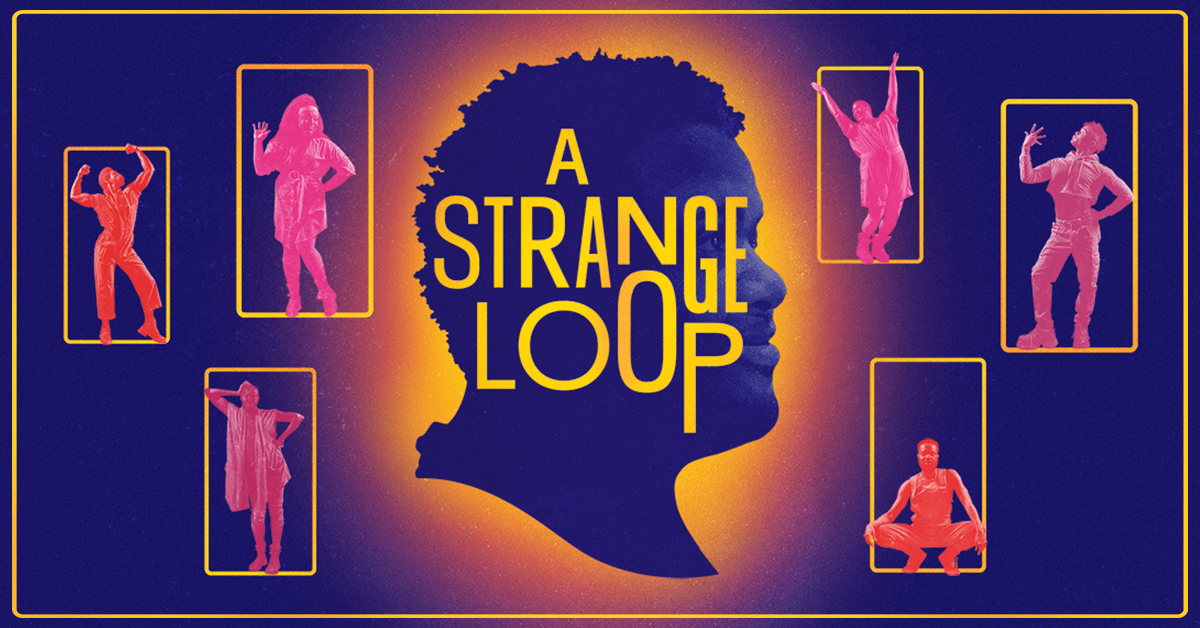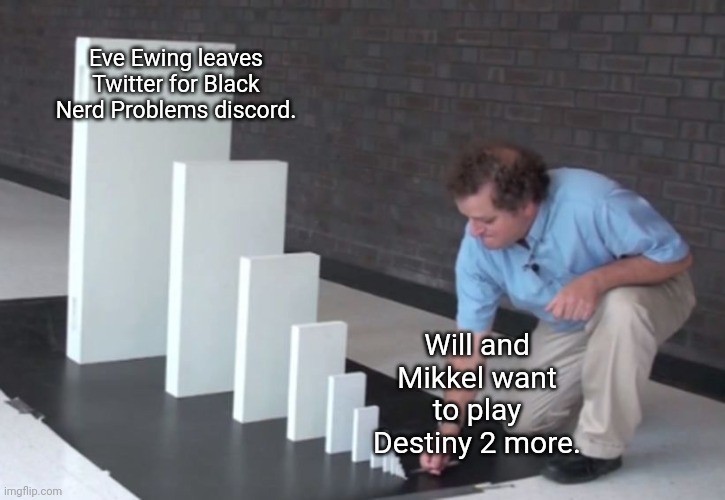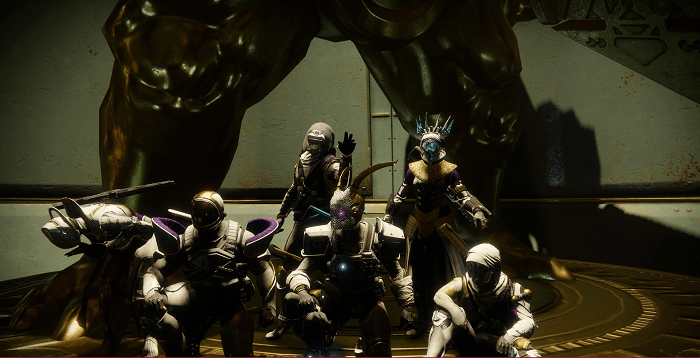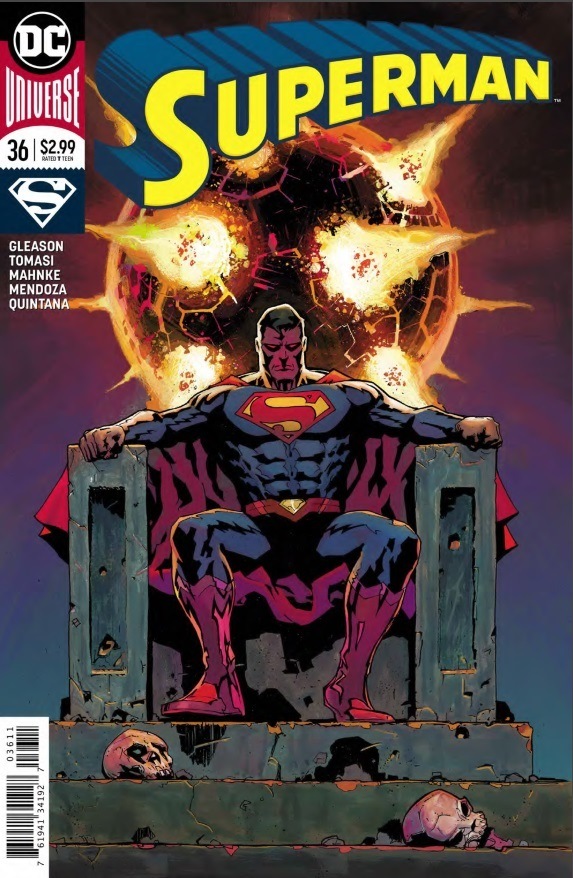Trains of Thoughts II: Playbill Scrawlings from the Filipino American Correspondent
Trains of Thoughts II: Playbill Scrawlings from the Filipino American Correspondent
Now.
I am a sucker for what I call “Narrative Appropriateness.” When the sequences of events in a story, or in a life, manage to hold mirroring significance to each other. When the universe decides to showcase that it has a sense of humor and makes you think about how everything is somehow connected, how out of all the tracks you could have chosen, you have found yourself at this particular stop pondering similar questions whether by design or happenstance.
This time five years ago, I wrote my first editorial for Black Nerd Problems, titled Trains of Thought on Asian American Representation in Comics where after reading a series of disparate articles, I mused on what all of it meant to me, weaving in different anecdotes about the ways I sought representation.
For the better part of December 2022, I had been working on this particular piece, this missive, this meditation on what it meant to be a mixed Filipino American writing for this site called Black Nerd Problems, trying to once again weave all of the disparate threads together to tackle an assortment of topics.
As such, it is somehow fitting that as I was struggling to figure out how to start the sequel. I was fortunate enough to see A Strange Loop, a musical about a fat, gay Black man writing a musical about a musical about a fat, gay Black man writing a musical about… You get the jist of it. And we’ll talk more about A Strange Loop later, but it’s only fitting that five years after I started writing for Black Nerd Problems, I get to experience a phenomenal play about the Black experience via musical theater, because I very much owe where I am today because of musical theater.

Then.
Circa 2011, I was a junior in public high school in what, at the time, was the sixth richest county in the United States, which not so coincidentally was also predominantly white. I was one of a handful of Asian American students, and critically for this part of the story, one of the handful that was in the choir program but not part of the theater program. As such one day, I was asked if I wanted to audition for the winter musical, Thoroughly Modern Millie. At that time, I did not have the same level of media literacy I do now, but in an effort to try and be sociable, I said why not. Thus, the course of my life was irrevocably changed because of a racist movie turned play.

Way Back When.
The original Thoroughly Modern Millie was a 1967 musical romantic comedy about the titular Millie moving to 1920’s New York City with the intents to find a wealthy businessman to wed; however, as it turns out, the hotel she was staying at was run by a Mrs. Meers, a extravagantly villainous woman who was selling her tenants into sexual slavery while employing two and I quote “Orientals” to help with this endeavors. “Fun” fact, Oriental #2 was originally played by Pat Morita in one of his earlier roles, a piece of trivia that continues to haunt me ever since I found out about it from the Wikipedia page.

Now, for whatever reason, this movie was adapted to a musical in 2000, where the Chinese henchmen are afforded the common decency of names and redemption arcs, as Ching Ho has a happy ending with a Ms. Dorothy, and Bun Foo testifies against Mrs. Meers and becomes a stenographer with his 60 words per minute typing speed.
Then.
The younger iteration of me did not quite grasp the nuance of the different racial dynamics in Thoroughly Modern Millie, or any piece of media really. Looking back, I am thankful that there was at least an effort to make sure the roles were cast racially appropriate insofar as having the Chinese henchmen played by Asian Americans, although current me has many feelings about having spoken more Mandarin and Cantonese than Tagalog in their life as a result. And I am eternally grateful for being taught to love the stage and the performance. So much of who I am now I owe to having the opportunity to write for Black Nerd Problems, which I owe due to getting into slam poetry, which I owe due to getting into theater on a whim.
Now.
As of the time of writing this, I have written over 700 articles for the site. I’ve run the gauntlet across media types and formats. I’ve covered comics, television, movies, anime, and video games. I’ve been a writer, a coordinator, and even an editor for a brief time. I’ve conducted interviews, hosted streams, and helped cultivate an ever-growing discord community as a byproduct of wanting to play more Destiny, an anecdote we’ll circle back to shortly.
Then.
In 2013, I end up going to a predominantly white university and, in wanting an extracurricular to balance out an aggressively technical engineering degree, I tried several different arts programs. After failing to get callbacks to any theater production or a cappella groups, I managed to find friends with the slam poets and also managed to have the distinction of getting to compete in all four of their monthly slams, and managed to get last place in each and everyone that year. But every loss just gave me more drive to become better at both writing and performing, and as such it took over my life for the next three and a half years, and I’d argue I got good at the game called slam.
I was fortunate to be in the collegiate and adult scene during its heyday, where every school and venue was diligently recording all of their performances. And on a whim, I cold-messaged one of the writers whose work wow’ed me and we exchanged conversations about our different schools and writing and became acquaintances to friends to best friends to even stage partners for a while. During this era, they became involved with BNP and through them, I managed to get an introduction with the Editor-in-Chief of BNP who as it happened was also a fellow Guardian.
Now.
Due to the loot treadmill nature of Destiny 2, a nontrivial part of my life is anchored in the ritual of routine. With the weekly loot refresh happening every Tuesday, week after week, I complete a series of pinnacle activities from nightfalls, dungeons, and raids. And because of this fact, I end up playing with my EIC at a fairly regular pace to the point where I probably spend more time in a voice chat with him than a lot of my other friends. But dating back to King’s Fall where we would be each other’s clans subsitute raider, to the eventual co-leaders of our unified clan post the attrition of time, we held court over a wide variety of activities. The perils of Rivensbane, the independent trauma of Reckoner, the arduous tasks of Shadow, the six months for me and two years for him journey to Descendent, and a litany of Grandmaster complete that used to be hour long affairs that we now confidently march through empowered by knowledge and a well-balanced team.
And certainly, one of the funniest things that has happened a(n) (in)direct consequence of our Destiny endeavors is that we now have a thriving Discord for nerds, which is a sentence that I almost certainly wouldn’t believe had I not recounted it several times to various audiences. But what started as a pick-up LFG evolved into Saturday game nights evolved into a sprawling server of channels and threads where folks discuss all manner of content.

Then.
When Black Nerd Problems posted their listing for new writers, I read the posting and was immediately piqued by the language of the post. It was a call for comic book reviewers. Any person of color was welcome to apply. At this point in time, I had seen the site from its very start, and its articles were part of my regular reading list. This was when I grew to adore both the comedic and critical tone the writers of the site were able to take, and I grew interested in 1) how much media access they had and 2) how much insight this continual access could provide. BNP had a few guests non-Black PoC guest writers in the past, so it made sense to me that they would be open to me, but I still remember the nervousness of asking my EIC over the old school PSN Party chat if I could apply. This was late 2017, and after struggling to write a comic book script for years, I figured the best way to learn the medium would be to immerse myself it and saw the opportunity present itself.
To this day, I remain thankful that they did and after a test review of Tomasi and Gleason’s Superman #35, I found myself reviewing Superman #36 the next month, my very first article for the site. From there on, I took every series that seemed remotely interesting. I added to my list and devoured content. I was determined and apparently voracious as I became well-versed in almost every single major publisher at one point or another, and apparently I was good enough to get solicitations for interviews and perhaps more quickly than I realized at the time, but I started reveling in learning the art of pop culture critique and being a part of this community.
Way Back When.
The “mixed kids have mixed feelings about things” is a mantra I learned to repeat and unravel in college. It’s hard to realize how much white-ness pervades every aspect of American society, because hiding how deeply it is entrenched is embedded into the structure. You don’t actively realize that when you read books you automatically picture a white protagonist protecting the honor of a white love interest. You lack the vocabulary to express why you’re so enthralled with Jackie Chan Adventures or the prince of a 90’s Cinderella adaptation.
/cdn.vox-cdn.com/uploads/chorus_image/image/71657756/1997s_cinderella_is_a_timeless_american_classic.0.jpeg)
You make the mistake of telling your immigrant mother that you identify as white in middle school because white is the majority of the people around you, the majority of the friends you made, and the vast preponderance of culture you consume. It takes years to unpack that. It takes people talking about the absence of themselves in media and in media critique to even begin to question it.
Now.
It would probably be a little self-indulgent to list my “great hits,” but at the same time, I’ve been fortunate enough to be given responsibilities that made me confident enough to seek more for myself. I’ve gotten to write about finding kinship with Superboy, analyzing the nostalgia and evolution of a sequel series of a beloved 80s sports franchise, proselytize about a Japanese high school boys’ volleyball club, and the startling sincerity of satire. I’ve been misquoted by Rotten Tomatoes about my opinion of Iron Fist Season 2 and also gotten to talk with a lot of really cool people about how they make a wide variety of art and how passion is at the core of the difficult work.
The niche I’ve found here helped me realize that while I’ll always have a fondness for poetry and fiction, the thing that I excel at, the thing that I thrive in is critique and nonfiction. You know, it makes some level of sense that the technical writer takes great pleasure in learning how different things came together and function, and then explain these things in a variety of prose with multimedia, but the path I took to get here was a little meandering I must admit.
Then.
When Black Panther released, it was also around the time that Black Nerd Problems was hitting its 5th anniversary of being a site that exists and flourished from (and this is a direct quote from our About page) “a flippant conversation” between the founders “complaining about the lack of minority representation in DC Comic New 52.” Those three some years ago, it still felt like I was a guest in the space. There was some distance in the fact that I was not in fact a Black nerd. But the thing is that Black Nerd Problems always aimed to provide more perspectives and more viewpoints, to expand the scope and let the people of color talk their truths, and it’s nice being afforded some space here.
Now.
I am not the first, nor the only non-Black person of color to write for this site, although I do hold the distinction of being one of the more prolific writers. And with those 700 some articles, there is one thing I found to be true.
There is something about the specific becoming universal. Generalizations are a terrible way to approach writing, and it’s in the process of discovering the particulars, the pertinent details that we uncover the truly worthwhile things. It comes from speaking directly to the target audience regardless of the other viewers.
When I walked out of A Strange Loop, I knew I had just seen something that wasn’t exactly for me, but it was still something I could respect and draw equal parts wonder form the deft display of repetition and callback and exasperation at the non-trivial number of all-White folks laughing, clapping, and cheering at all of the worst possible times.
But for me, a non-binary Filipino American pop culture consumer and aspiring nonfictionalist, it did two things:
- It made me want to write.
- It got me thinking about this time in high school where the theater kids asked me if I wanted to audition for a musical.
And there’s something about narrative appropriateness that I just vibe with, y’know?
End of Line, Start of Another.
Want to get Black Nerd Problems updates sent directly to you? Sign up here! Follow us on Twitter, Facebook, Youtube, and Instagram!
The post Trains of Thoughts II: Playbill Scrawlings from the Filipino American Correspondent appeared first on Black Nerd Problems.




